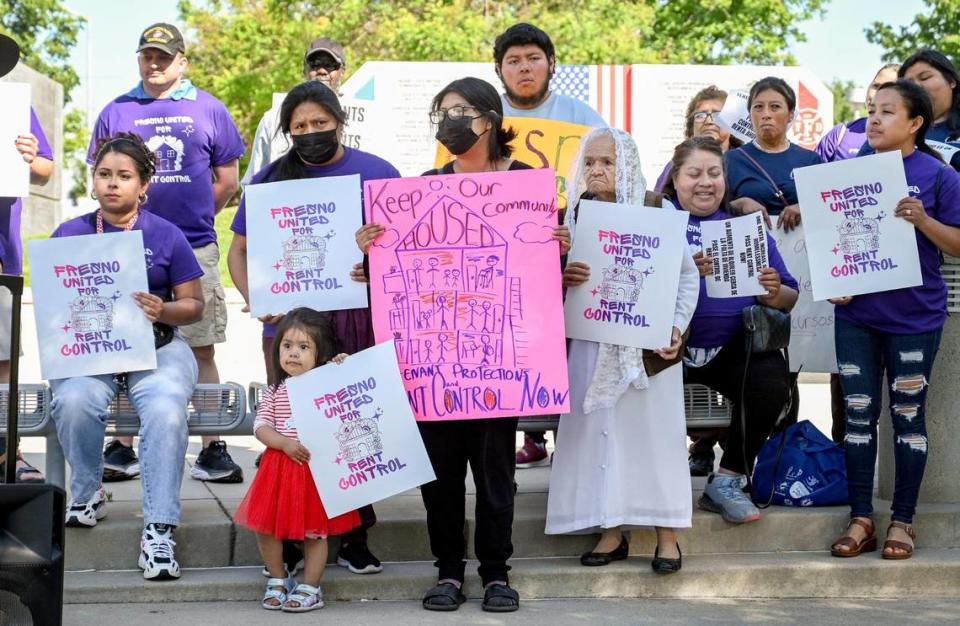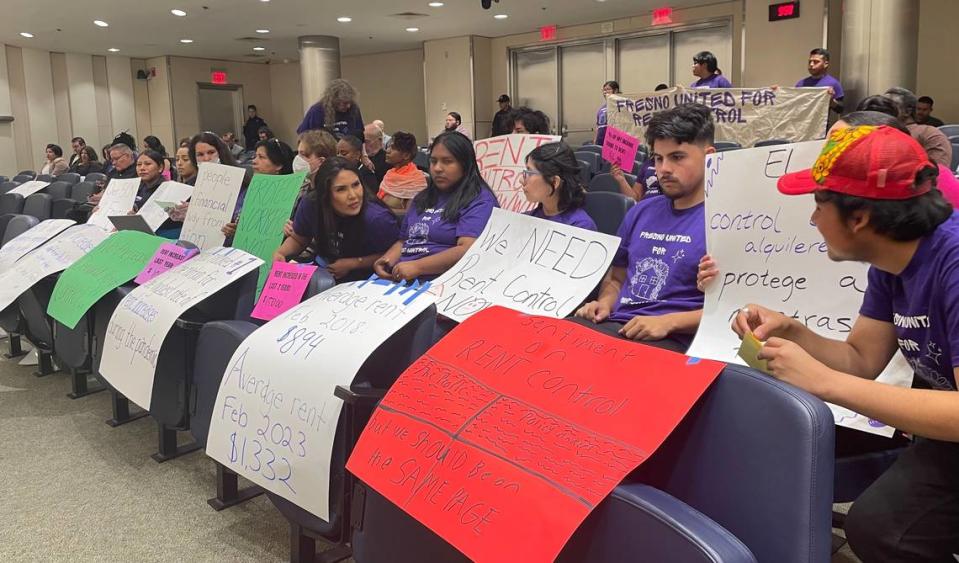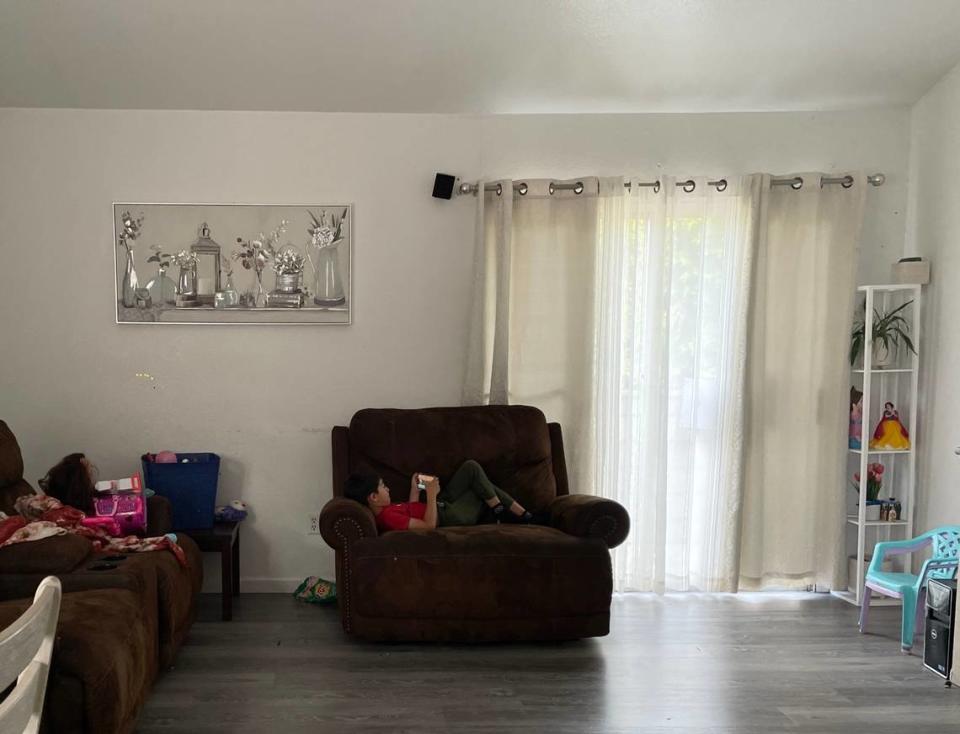Fresno family spends over 30% of its income on housing. Would rent control change that?
After a long and difficult search for housing, Juana Iris Meza and her family moved into a three-bedroom rental unit, a condominium on Shields Avenue west of Highway 99 in Fresno.
While they needed the bigger space for their family of six, they experienced a steep increase in their monthly rental costs. The family used to pay $560 for a one-bedroom apartment. Now, they pay $1,350.
But Meza said she is worried their rent could go up again. And with an annual income of $45,000 - Meza, 38, works part-time for an education nonprofit, and her husband is a plumber - the family can’t afford any more rent increases.
“If they raise my rent $100 more,” she said, “I don’t think I’ll be able to pay.”
Like thousands of Fresno households, the Meza family is rent-burdened, meaning they spend over 30% of their income on housing. That leaves little money for other essentials, like food and transportation. Community-based organizations, advocates and renters say this is why it’s time for the city of Fresno implement a rent control policy to help protect residents.
According to the Urban Institute, rent control laws aim to maintain existing affordable housing and limit disruptions caused by rapid rent increases. In 2020, California implemented the Tenant Protection Act, a statewide rent control that caps rent increases at 5%, plus the local consumer price index, or 10%, whichever is lower. (Local governments can put restrictions into place, and a number of California cities have already done so.)
In Fresno, which has seen some of the highest rent spikes nationwide in recent years, some are calling for additional measures. They want an annual rent cap at 3%, plus the creation of a Rental Mediation Board to address eviction notices, retaliation cases and rent hikes above the allowable increase. While they say it would strengthen local tenant protections, city leaders say the policy could discourage further housing development in Fresno.
Meza supports the rent control proposal because, she said, they can barely make ends meet as it is. If rent prices keep going up, she will consider moving in with another family or leaving Fresno altogether for a more affordable location.
“How are they going to keep raising our rent,” she said, “if our wages have been stagnant for years?”
Over half of Fresno rental households are cost-burdened
A Fresno Bee analysis of the U.S. Census Bureau’s 2021 American Community Survey data found that 52% of all Fresno renting households, or 44,386 of 84,164, spend over a third of their income on rent.
The burden is even higher on the most vulnerable in the community: 92% of the 18,259 households that earn less than $20,000 annually are rent-burdened. As income goes up, however, the percentage of people that are cost-burdened goes down: 27.5% of Fresnans that earn between $50,000 to $75,000 are cost-burdened.

During an April rally at Fresno City Hall, community groups and residents called for the city to include tenant protections such as rent control in the 2023-24 budget planning decisions.
Then, during a Fresno City Council meeting last week, a few dozen organizers and community members used public comment at city hall to express their disappointment that the city didn’t adopt rent control during the budget cycle.
“Many Fresno renter households are one paycheck away, one emergency away, from being homeless,” said Camila Rivera, a campaign coordinator for Power California and member of the Fresno Housing Coalition, addressing the council. “We need you all to step up now.”

Why some Fresno city leaders say they don’t support rent control
City leaders didn’t include any specific allocations for rent control in the new budget – but said they’re supporting Fresno renters in other ways.
During a press conference last Thursday announcing the city’s adopted fiscal year 2023-24 budget, Fresno Mayor Jerry Dyer responded to the call for rent control and defended his administration and the council’s housing initiatives.
He said the city has dispersed $60 million of state and federal funds for rental assistance over the last two years; has initiated the construction of over 3,300 new affordable units – an 1,600% increase compared to the past five years; and has allocated $2 million for the eviction protection program in this year’s budget.
“Sounds to me like we’re doing everything we can as a city,” he said. “I feel for the folks that are out there that are facing evictions, but in terms of rent control, I can tell you I don’t support that.”
Dyer said he has seen rent control in other cities lead to more slums because if landlords are making less money, they have less to invest in their properties for maintenance. He also said rent control could dissuade future development in the city.
A 2019 report by the Urban Institute said rent control is successful in promoting stability and affordability for people in rent-controlled units. The report also said that “although empirical research has found some evidence that rent control negatively affects maintenance, its effect on new construction remains speculative.”
District 3 Councilmember Miguel Arias said in an interview with The Bee on Wednesday that the mayor’s logic assumes “landlords were investing in the property in the first place.”
“It’s crystal clear that they’re not,” he said. That’s why, Arias said, the city had to create the Anti-Slum Enforcement team in 2016 dedicated to holding slumlords accountable to health and safety requirements.
Arias added that he’s open to a substantive conversation to explore what rent stabilization could look like in Fresno, but didn’t say whether or not he supports rent control. But, he said, one of the challenges in implementing rent control in Fresno is that powerful special interest groups – such as developers, landlords and business associations – oppose the policy.
These groups, he said, have “a very clear opposition backed up with campaign contributions to kill rent control before the debate even begins.”
In an interview with The Bee on Wednesday, Council President Tyler Maxwell of District 4 said rental costs are only one issue facing renters. In a recent meeting with a group of about 20 women, he said he heard a number of “heart-wrenching” stories about families experiencing eviction after reporting code violations in their apartment complex.
“Over half of the folks mentioned something that wasn’t directly related to the price of rent or the cost of rent,” he said. “It was more about being forcefully removed from where they’re living.”
The city, he said, needs to do a better job educating the community about the city’s existing programs such as the eviction protection program or tenant relocation program.
When asked whether he would ever put rent control on the agenda during his tenure as council president, Maxwell said the way to address rent prices is through increasing the supply of housing. This council’s opinion, he said, is that “the most effective way to control rents here in Fresno is getting more developments off the ground.”
But Arias said the market alone can’t solve the city’s housing needs – especially when it comes to affordable housing for the most vulnerable.
“We cannot build ourselves out of this problem,” he said.
Fresno among ‘last major cities’ to have no rent control
Karla Martinez, a policy advocate with the Leadership Counsel for Justice and Accountability, one of the organizations in favor of rent control, said the new affordable housing the city is building is “great” because rent control alone “isn’t going to solve all our housing issues.”
“We need more housing, we need more shelters, folks need assistance,” she said, “and then one tool is rent control with tenant protections to make sure that folks are able to stay housed while implementing these other components.”
She disagrees with Dyer that rent control will dissuade new housing development, saying that state law exempts newly constructed apartment buildings, as well as single family homes and condominiums, from rent control ordinances.
If the city doesn’t implement rent control soon, Martinez said it could risk an increase in homelessness. A study from the University of California San Francisco published last week found that many Californians experience homelessness primarily because they cannot afford housing.
“We are one of the last major cities to not enforce a local rent control” in California, she said.
As for Meza, she hopes the city passes some sort of rent control soon, and is worried about what will happen to her family if they don’t.

“I hope they don’t raise my rent,” she said, “because, if they do, we’re going to be one more family that goes to live in the street.”

